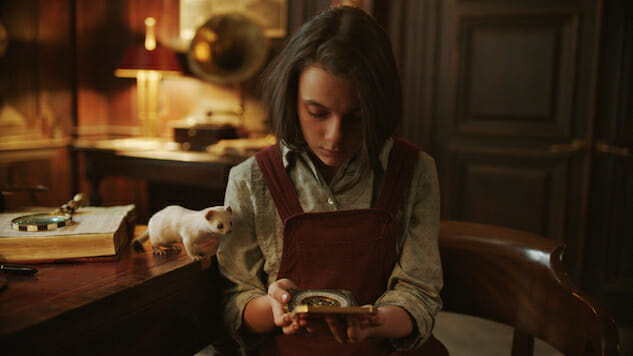His Dark Materials, Good Adaptations, and the Nature of the Soul
Photo Courtesy of HBO
Adaptation is something I think about a lot. How do you translate the ineffable stuff from a medium like a print novel to a medium like a TV series? How do you create a script that fits its medium but doesn’t come across as a betrayal of the original work’s tone, style, way of rendering characters? Why we are so inexhaustibly interested in adaptation (in some cases wrong-headedly); why certain books get adapted for screen over and over and over? I think about when and why and how one would make the decision to pursue ultra-high fidelity to a source text or to deliver more of an interpretation, a fantasia, a rhapsody; a critique, a parody. Sometimes it seems all the way too stupid to expect a movie or TV show to deliver the experience of reading a great novel. Still, there’s something oddly gratifying, and sometimes even thrilling, about finding that a director imagined a certain character exactly the same way you did, or seeing a mise en scene that appears to have burst out of your own mind’s eye like Athena from the cranium of Zeus, isn’t there? (I’m thinking about the casting of the Harry Potter movies, for instance, or the artistic direction of The Handmaid’s Tale.)
It’s a complicated and oblique thing, rendering the vision of an artist whose medium is words. A great adaptation exists in a dialogue with its source, but it also stands on its own feet as a cinematic work. It somehow reproduces the experience of reading the story but it doesn’t only create a facsimile. Hopefully, it enhances our understanding of the original text, illuminates it in a new way that only a screen adaptation could pull off. Or it’s wildly divergent in a way that creates a satisfying dialectic. To that end, I knew HBO’s His Dark Materials had passed that acid test when I realized I was enjoying the narrative, but also pondering the nature of the soul.
Philip Pullman’s stunning trilogy takes place in a funhouse-mirror version of Oxford and London, a parallel universe that’s mostly familiar but has a number of intriguing twists, the most pronounced of which is that people’s souls manifest as talking animals (a daemon is more embodied than a Harry Potter Patronus, and has much more of a human personality than a spirit guide; it is an individual with its own name, its own ideas). His Dark Materials captures Pullman’s world visually with an opulent but muted, somewhat steampunk rendering, full of soft gold and stony gray and terra cotta tones and ornate, finely detailed surfaces. The script is sometimes clunky and doesn’t entirely capture Pullman’s lovely, rigorous-but-warm intelligence, but it gets close enough, enough of the time. The cast is generally very strong (and the cast of the ill-fated 2007 film The Golden Compass did nonetheless present a fairly high bar on that score; the movie was terrible but they made great performer choices); Lin-Manuel Miranda’s sometimes frustratingly glib and self-indulgent portrayal of aeronaut Lee Scoresby notwithstanding. Dafne Keen is a powerhouse as Lyra Belacqua, Lucian Msamati is riveting as Gyptian king John Faa, and Ruth Wilson is dazzlingly creepy as the duplicitous, daemon-abusing Marisa Coulter. Perhaps most significantly, the adaptation nails an often-failed imperative of screen translation: it successfully communicates subtext by mindful use of visual language.